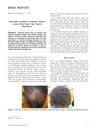 August 2023 in “Journal of Cosmetic Dermatology”
August 2023 in “Journal of Cosmetic Dermatology” Both minoxidil-spironolactone and minoxidil-finasteride treatments work for hair loss, but minoxidil-spironolactone is slightly more effective, especially in women.
[object Object]  August 2023 in “Stem Cell Research & Therapy”
August 2023 in “Stem Cell Research & Therapy” Using adipose-derived stem cell media with minoxidil may help regrow hair in men with hair loss.
 August 2023 in “Journal of Dermatological Treatment”
August 2023 in “Journal of Dermatological Treatment” Mesotherapy might improve hair growth, but more research is needed to confirm its safety and effectiveness.
 February 2023 in “Molecules”
February 2023 in “Molecules” Cactus extract from Notocactus ottonis may help promote hair growth.
December 2022 in “Archives of Dermatological Research” Adding cetirizine to minoxidil improves hair growth and thickness in women with androgenetic alopecia.

Topical minoxidil helps treat hair loss in teens, but more research needed for safe options.
3 citations,
April 2023 in “Veterinary sciences” Researchers found genes that may explain why some pigs grow winter hair, which could help breed cold-resistant pigs.
February 2023 in “Lasers in Medical Science”  36 citations,
June 2012 in “PubMed”
36 citations,
June 2012 in “PubMed” There are potential treatments for pattern baldness, but more research is needed to confirm their effectiveness.
Fructus Ligustri Lucidi water extract helps hair growth by promoting cell survival and activating specific pathways.
 9 citations,
December 2020 in “Journal of The American Academy of Dermatology”
9 citations,
December 2020 in “Journal of The American Academy of Dermatology” Platelet-rich plasma may help restore immune balance in bald patches, but its effectiveness in treating hair loss is limited.
1 citations,
June 2018 in “Pharmaciana” The hair tonic with 15% ethanol effectively promotes hair growth.
 2 citations,
November 2022 in “Biosensors”
2 citations,
November 2022 in “Biosensors” A new, efficient method has been developed to detect darolutamide and thalidomide, drugs used for certain hair loss and prostate cancer treatments, in pharmaceuticals and body fluids.
 January 2024 in “Journal of cosmetic dermatology”
January 2024 in “Journal of cosmetic dermatology” Silibinin-loaded micelles significantly protect hair from UV-B damage.
[object Object]  August 2023 in “Indian journal of pediatrics/Indian Journal of Pediatrics”
August 2023 in “Indian journal of pediatrics/Indian Journal of Pediatrics” Topical treatments helped a child with Down syndrome and severe hair loss regrow most of his hair.
 55 citations,
January 2002 in “Journal of liposome research”
55 citations,
January 2002 in “Journal of liposome research” New liposomal formulations may improve delivery of treatments to hair follicles, potentially helping with hair loss.
 37 citations,
January 1997 in “Clinics in Dermatology”
37 citations,
January 1997 in “Clinics in Dermatology” Hair problems are common and distressing for women, but increasing knowledge of treatments offers hope.
 36 citations,
May 2011 in “Dermatologic therapy”
36 citations,
May 2011 in “Dermatologic therapy” No treatments fully cure or prevent alopecia areata; some help but have side effects or need more research.
 15 citations,
July 2019 in “Lasers in surgery and medicine”
15 citations,
July 2019 in “Lasers in surgery and medicine” The erbium-glass laser effectively promotes hair regrowth in alopecia areata.
 15 citations,
September 2015 in “Journal der Deutschen Dermatologischen Gesellschaft”
15 citations,
September 2015 in “Journal der Deutschen Dermatologischen Gesellschaft” Skin doctors should recognize and treat conditions like hair-pulling and skin-picking early, often using therapy and medication, to help 50-70% of patients.
 14 citations,
July 2016 in “Pediatric Dermatology”
14 citations,
July 2016 in “Pediatric Dermatology” A 9-year-old girl with alopecia areata had successful hair regrowth using bimatoprost after other treatments failed.

No treatment alters the natural progression of alopecia areata, and effectiveness varies, with some possibly working better in children.
 April 2012 in “Informa Healthcare eBooks”
April 2012 in “Informa Healthcare eBooks” Telogen effluvium is a common hair loss condition where many hairs enter the resting phase, often not noticeable until significant loss occurs, and treatment focuses on the underlying cause.
 October 2022 in “International Research Journal of Modernization in Engineering Technology and Science”
October 2022 in “International Research Journal of Modernization in Engineering Technology and Science” COVID-19 vaccines may cause hair loss in people who are genetically prone to it.
August 2022 in “Journal of Cosmetic Dermatology” 1% topical cetirizine may help treat hair loss but is less effective than minoxidil.
 1113 citations,
August 1999 in “The New England Journal of Medicine”
1113 citations,
August 1999 in “The New England Journal of Medicine” Hair follicle biology advancements may lead to better hair growth disorder treatments.
 421 citations,
April 2012 in “The New England Journal of Medicine”
421 citations,
April 2012 in “The New England Journal of Medicine” Alopecia Areata is an autoimmune condition causing hair loss with no cure and treatments that often don't work well.
 157 citations,
April 1994 in “Clinical endocrinology”
157 citations,
April 1994 in “Clinical endocrinology” Androgens can cause hair growth in some areas and hair loss on the scalp.
 151 citations,
February 2007 in “International Journal of Dermatology”
151 citations,
February 2007 in “International Journal of Dermatology” Alopecia areata causes hair loss, has no cure, and various treatments exist.
 147 citations,
April 1994 in “Drug Safety”
147 citations,
April 1994 in “Drug Safety” Some drugs can cause hair loss or increase hair growth, but these effects are usually reversible when the drug is stopped.























